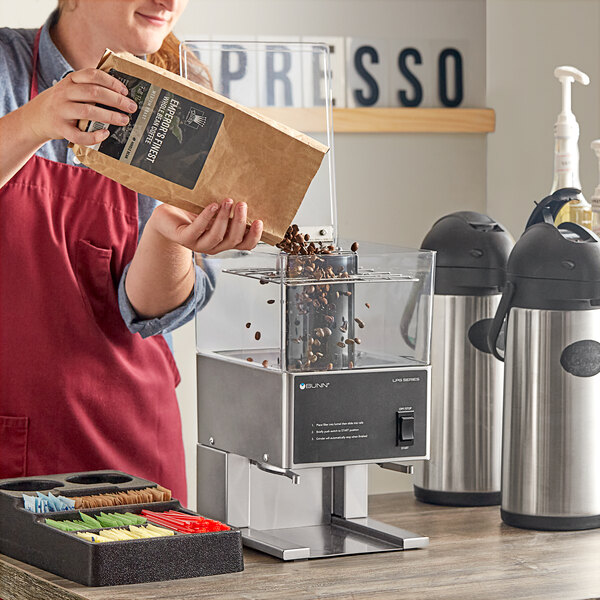Industrial Coffee Mill Guide: Boost Performance and High Quality
In the competitive landscape of coffee production, choosing the ideal industrial coffee mill plays a pivotal function in enhancing both performance and product quality. Recognizing the nuances of various mill kinds and crucial functions-- such as personalized work setups and durable building and construction-- can substantially affect the last flavor account of the coffee.
Recognizing Mill Kinds
When choosing a commercial coffee mill, comprehending the various kinds readily available is vital for optimizing both taste removal and functional effectiveness. Both key kinds of grinders are blade mills and burr grinders. Blade grinders utilize sharp blades that cut coffee beans into irregular sizes, causing uneven extraction and potentially undesirable flavors. While blade mills are usually much more ideal and affordable for small procedures, they are generally not recommended for commercial usage.

Eventually, selecting the ideal kind of grinder is important to keeping high quality and efficiency in coffee production, making it imperative for services to purchase top notch burr mills for optimal outcomes.
Trick Attributes to Consider
Choosing a commercial coffee grinder calls for cautious consideration of numerous key functions that can significantly influence both efficiency and the overall coffee experience. Among the key aspects to assess is the grinding system. Burr mills are usually preferred over blade grinders, as they offer a constant work dimension, which is essential for ideal removal and taste.
Another important function is the mill's ability. Depending upon the quantity of coffee you need to process, select a version that can manage your requirements without giving up rate or top quality. Additionally, think about the grind settings offered. A functional mill with multiple setups allows you to tailor the work size to various developing methods, improving the coffee's taste account.
Examine the grinder's sound level, specifically in a hectic café or manufacturing environment, where extreme noise can be turbulent. Investing in a mill that balances these features can considerably enhance both functional effectiveness and the top quality of the coffee served.
Optimizing Grinding Refine
To achieve the best results in coffee preparation, enhancing the grinding procedure is essential. The grind size substantially affects removal, taste, and overall high quality of the made coffee.


In addition, checking the grinding rate can enhance the process. Slower grinding usually generates less warm, maintaining delicate flavors and scents. Alternatively, quicker grinding may create excessive heat, negatively affecting the coffee's high quality.
Upkeep and Treatment Tips
Proper maintenance and care of commercial coffee mills are essential for making certain optimal performance and durability. Routine cleansing is the structure of maintenance; residue build-up can affect taste and grinding efficiency. It is a good idea to clean the grinder after each usage, wiping down the exterior and getting rid of any kind of coffee grounds from the burrs.
Additionally, evaluate the grinding burrs for damage. Boring burrs can compromise work consistency, so they should be changed as needed. Industrial Coffee Grinder. Periodically adjusting the mill is also essential, as this maintains the wanted work size for numerous brewing methods
Lubrication of relocating parts should be carried out according to the manufacturer's specifications, as this reduces rubbing and extends the life of the equipment. It is crucial to make use of food-grade lubes to guarantee safety and security and compliance with health laws.
Finally, keep the mill in a dry and steady atmosphere look at this web-site to stop rust and deterioration. By adhering to these upkeep and treatment suggestions, drivers can company website improve the effectiveness of their industrial coffee mills while making sure premium output and prolonged functional life.
Roi Analysis
Assessing the roi (ROI) for industrial coffee grinders is critical for companies seeking to maximize their coffee manufacturing capabilities. A detailed ROI analysis helps determine the monetary feasibility of purchasing premium grinders, enabling organizations to consider the preliminary expenses against potential gains.
Examine the purchase cost of the mill, consisting of installment and any type of essential modifications to existing framework. High-performance grinders usually lead to reduced grinding time and enhanced throughput, which can substantially improve performance.
Additionally, think about the impact on item quality. Industrial Coffee Grinder. Superior grinders produce a more constant grind dimension, which can enhance taste profiles and consumer satisfaction, eventually driving sales. By increasing the quality of the end product, businesses can validate greater pricing, resulting in increased profits
Conclusion
In recap, a commercial coffee grinder plays an essential function in improving both effectiveness and product high quality within coffee production. Eventually, the tactical investment in a reputable grinder contributes significantly to improved revenue and competition in the coffee sector.
In the affordable landscape of coffee manufacturing, choosing the best go to this website industrial coffee mill plays a crucial duty in improving both effectiveness and product top quality. The 2 main types of grinders are blade mills and burr mills. Within the burr grinder classification, there are flat burr grinders and conelike burr mills, each with its advantages. Burr mills are usually favored over blade mills, as they supply a consistent grind size, which is essential for optimal removal and taste.
In recap, an industrial coffee grinder plays a critical role in boosting both effectiveness and product top quality within coffee manufacturing.